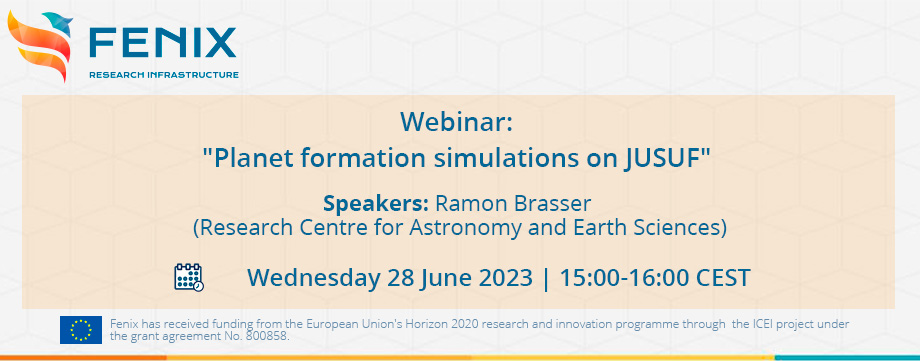
The 21st Fenix Infrastructure Webinar "Planet formation simulations on JUSUF" takes place on Wednesday, June 28 2023, at 15:00 CEST. Read all the details below and register at: https://us06web.zoom.us/webinar/register/WN_BhfAm8NeQJ22xelz9LCi0g
Date and Time: Wednesday, June 28, 15:00-16:00 CEST
Cost: Free of charge
Speakers: Ramon Brasser, Research Centre for Astronomy and Earth Sciences; Budapest, Hungary
Description: Planet formation is a hot topic in astronomy, geosciences and in planetary science. It encompasses the evolution of protoplanerary discs, accretion of small bodies to small planets to large planets, and the interaction between planets and the gas disc.
Here you will have an introduction to running planet formation simulations on the ICEI infrastructure JUSUF using the GPU N-body integrator GENGA.
During this webinar, you can expect:
i) a brief overview of the current problems in rocky planet formation,
ii) an introduce to GENGA and how I used that in my proposals,
iii) how to run GENGA on JUSUF,
iv) the limitations of current hardware,
v) and then, show output and results from the N-body simulations.
Who should attend?
- HPC infrastructure users
- Current Fenix users interested in learning how to make use of ICEI computing resources for planet formation simulations
- Researchers working in the field of planetary sciences, geosciences and astronomy; other interested parties
Main takeaways
- The JUSUF infrastructure is well suited for planet formation simulations
- Planet formation is an exciting field filled with both scientific and numerical challenges
Agenda
- Presentation
- Q&A
Register for free at https://us06web.zoom.us/webinar/register/WN_BhfAm8NeQJ22xelz9LCi0g